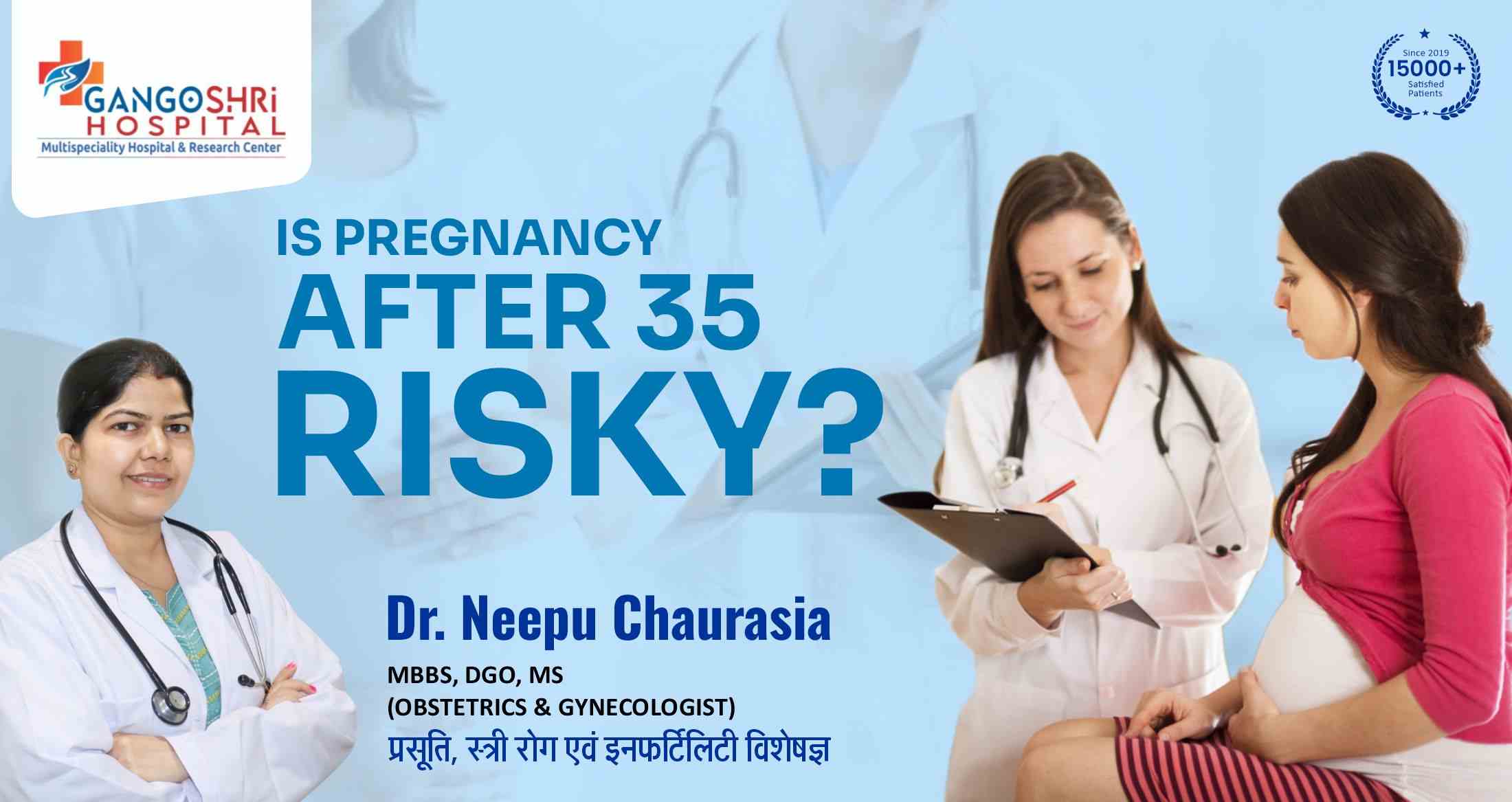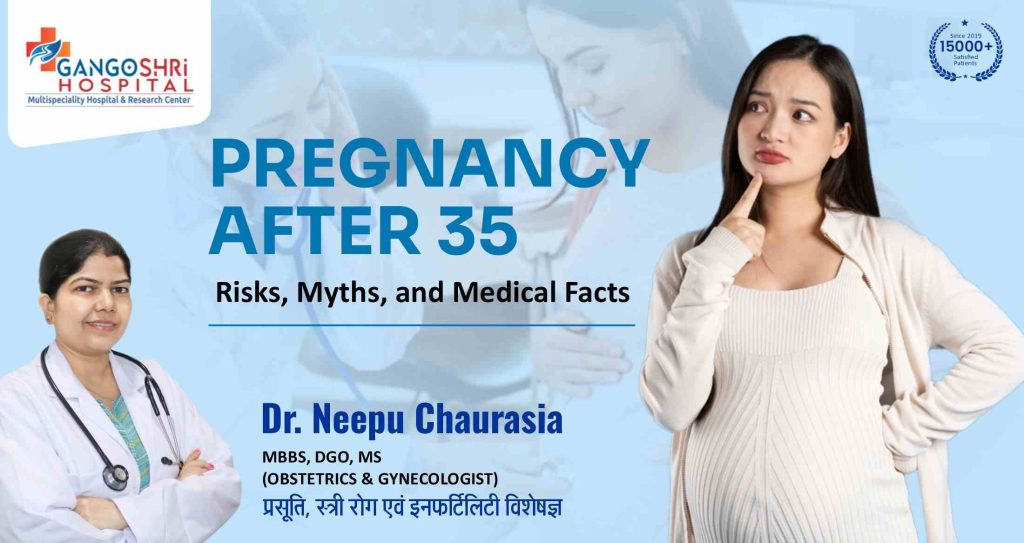Pregnancy After 35: Risks, Myths, and Medical Facts
Introduction
Modern women are rewriting the rules of motherhood. With growing career opportunities, financial independence, and lifestyle choices, many women today are choosing to start or expand their families later in life—often after the age of 35 and one such possibility for this could be finding the best gynaecologists in Varanasi. While this decision is empowering, it also comes with several questions and concerns:
- Is pregnancy after 35 risky?
- Does fertility completely drop?
- Are complications inevitable?
- Can one still have a safe, natural delivery?
These are valid concerns, but not all of them reflect medical reality. In fact, advances in healthcare and proper planning have made pregnancy after 35 safer than ever before. In this blog, we’ll break down Pregnancy After 35: Risks, Myths, and Medical Facts, while offering guidance for women planning motherhood later in life.
Understanding the Risks of Pregnancy After 35 (And How to Manage Them)
Pregnancy after the age of 35 is often medically categorized as an advanced maternal age pregnancy. This does not mean it is unsafe—it only means certain risks are statistically more common. Let’s understand them one by one.
- Miscarriage and Pregnancy Loss
One of the biggest concerns after 35 is the higher chance of miscarriage. Research shows:
- Women aged 35–39 have an 18–20% risk of miscarriage.
- At 40 years, the risk rises to about 40%.
- By 45 years, the risk may increase to 65%.
- In India, nearly 25% of women above 35 face pregnancy loss, compared to 8.4% in younger women.
👉 While these numbers seem worrying, they are not destiny. Early diagnosis, regular check-ups, and proper prenatal care significantly reduce the chances of pregnancy loss.
- Chromosomal and Genetic Conditions
Another concern is the increased risk of chromosomal abnormalities with age.
- The chance of Down syndrome is 1 in 1,000 in women under 30.
- At 35 years, the risk rises to 1 in 400.
- By 42 years, the chances are higher, making genetic screening an important part of prenatal care.
👉 Modern tests like NIPT (Non-Invasive Prenatal Testing) and detailed ultrasounds help in early detection, giving families time and options for the best possible care.
- Other Possible Complications
Pregnant women over 35 may be more prone to:
- Gestational diabetes
- High blood pressure or preeclampsia
- Preterm labor
- Placenta previa (when placenta covers the cervix)
- Stillbirth
- Higher chance of cesarean section
👉 The good news is that with regular monitoring, nutritious diet, safe exercise, and timely medical intervention, most of these risks can be managed effectively.
Debunking the Myths of Pregnancy After 35
Unfortunately, pregnancy after 35 is surrounded by myths that often discourage women unnecessarily. Let’s clear the air with facts.
Myth 1: It’s nearly impossible to get pregnant after 35.
Fact: Fertility does decline gradually, but it doesn’t disappear overnight. At 35, a woman still has about 15% chance of conceiving per cycle. Many women conceive naturally even after 35, especially with healthy habits.
Myth 2: Pregnancy after 35 always leads to complications.
Fact: While the risks may be higher, complications are not inevitable. With the right prenatal care, balanced diet, and lifestyle, many women above 35 enjoy smooth pregnancies and healthy deliveries.
Myth 3: Cesarean section is the only option.
Fact: Mode of delivery depends on factors like fetal position, maternal health, and labor progress. Age alone does not dictate a C-section. Many women over 35 have successful natural deliveries.
Evidence-Based Medical Facts About Pregnancy After 35
Fertility Outlook After 35
- About 66% of women aged 35 will conceive naturally within one year.
- Nearly 84% conceive within four years, especially with a balanced lifestyle and timely fertility support.
The Role of Prenatal Care
The World Health Organization (WHO) recommends at least 8 prenatal visits during pregnancy for better outcomes. Regular antenatal check-ups help with:
- Early detection of complications like preeclampsia, gestational diabetes, or thyroid issues.
- Monitoring fetal growth and screening for abnormalities.
- Guiding nutritional and emotional support for a healthy pregnancy.
👉 This makes choosing the right gynaecologist essential for women planning pregnancy after 35.
How to Support a Healthy Pregnancy After 35
If you are planning or already pregnant after 35, here are practical steps to ensure safety and wellness:
- Preconception Counseling – Consult your gynaecologist 3–6 months before trying to conceive. This helps identify and manage existing health conditions.
- Nutritious Diet – Include folic acid, iron, calcium, omega-3 fatty acids, and protein-rich foods to support maternal and fetal health.
- Gentle Exercise – Walking, swimming, and prenatal yoga improve circulation, reduce stress, and prepare the body for delivery.
- Avoid Harmful Substances – Quit smoking, alcohol, and limit caffeine intake.
- Emotional Support – Stress management through meditation, support groups, and counseling makes a big difference.
- Expert Medical Guidance – A gynaecologist with experience in high-risk pregnancies is invaluable for safe pregnancy outcomes.
Why Choose Dr. Neepu Chaurasia for Pregnancy After 35 in Varanasi?
If you are above 35 and planning for motherhood, specialized care can make all the difference. Dr. Neepu Chaurasia, one of the best gynaecologists in Varanasi, is highly trusted for handling high-risk and late-age pregnancies.
About Dr. Neepu Chaurasia
- Over 7 years of experience in Obstetrics & Gynaecology
- MBBS, DGO, MS (Obs & Gynae) qualifications
- Specialist in high-risk pregnancy, infertility treatment, and prenatal care
- Practicing at Gangoshri Hospital, Varanasi
Her empathetic, patient-first approach ensures that women feel supported at every stage—whether it’s fertility consultation, pregnancy management, or delivery. With updated medical knowledge and compassionate care, she has helped numerous women experience safe pregnancies after 35.
👉 To know more or book an appointment, visit: www.gangoshrihospital.com
Frequently Asked Questions (FAQs)
Q1: Is it safe to get pregnant after 35?
Yes. With proper medical care, prenatal monitoring, and healthy lifestyle choices, many women over 35 have safe, full-term pregnancies.
Q2: Can I have a natural delivery after 35?
Yes. Unless there are medical complications, age alone is not a reason for C-section.
Q3: What tests are recommended during pregnancy after 35?
Doctors may recommend genetic screenings, ultrasounds, NIPT, and regular blood sugar and blood pressure monitoring.
Q4: When should I see a fertility specialist if I’m over 35?
If you have been trying to conceive for more than 6 months without success, it’s wise to consult a fertility expert.
Q5: Is Dr. Neepu Chaurasia experienced in high-risk pregnancy care?
Absolutely. She has extensive experience in managing complex pregnancies, offering specialized care for women above 35.
Closing Note
Pregnancy after 35 is not something to fear—it is something to prepare for. While certain risks like miscarriage, genetic conditions, or complications are statistically higher, modern medicine and lifestyle awareness have made safe pregnancy after 35 very achievable.
By debunking myths, understanding medical facts, and seeking expert care, women can confidently embrace motherhood at the age that feels right for them.
And if you are in Varanasi or nearby, Dr. Neepu Chaurasia at Gangoshri Hospital considered as one of the best gynaecologists in Varanasi offers comprehensive care for women planning pregnancy after 35. With her compassionate guidance and medical expertise, many women have experienced healthy, happy motherhood—proving that age is just a number when it comes to bringing life into the world.





